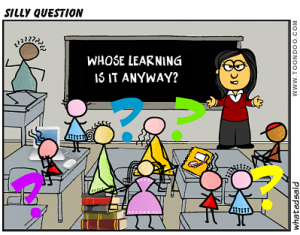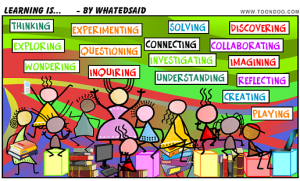I must admit I do like to write my own blog articles using examples of work from our wonderful school BUT this week I have included a BLOG POST from a well-known and highly respected educator…Kath Walker (Through a wonderful BLOG called ‘What Ed said……’) I have done this as part of our attempt to further ‘break down’ what the International Baccalaureate actually means! If Inquiry Based Learning is at the heart of the program then it stands to reason we need to know what it actually looks like, sounds like and feels like…..If you would like to look at previous articles please read other posts further below……so here we go…………
Kunyung is an ‘Inquiry Based’ school and last year our staff spent a lot of time inquiring into what that actually means! We asked questions like “In the best inquiry classroom ever- what would the teacher be doing? What would the students be doing? What would the task look like?”
The discussions, conversations and change in practice as a result of this work has been incredible….particularly concluding that sometimes explicit teaching is required to take place that is NOT inquiry practice!! Please read below and think about your stance on inquiry!! Over the coming weeks I shall put examples of our students @ work in an inquiry classroom………visit our blog if you get a chance to see Level Team examples also!!
This is how inquiry teachers teach…by whatedsaid |
I have long been utterly intrigued by the question “what makes an inquiry teacher’ – why is it that some find it such a natural disposition and while others struggle SO much with sharing power or seeing a bigger picture? But I’ll save my musings on that for another time…. Today, I am thinking about what inquiry means for the act of ‘teaching’ itself. Here are techniques or approaches I observe inquiry teachers use. A dozen of the best…..
1. They talk less. It’s that simple (I’m still working on that one myself!!)
2. They ask more. The discourse in an inquiry classroom is rich with quality questions – inquiry teachers know how to use questions to help students uncover their own thinking and understanding.
3. They relate – with the heart as well as the head. The BEST inquiry teachers I see genuinely enjoy their students and know them. Knowing your students is the key to successful facilitation – particularly of personal inquiries.
4. They let kids in on the secret – inquiry teachers have a transparent style. It’s not just about putting learning intentions up on the wall – they constantly ensure their kids know why they are doing what they are doing. Inquiry teachers often think aloud – they reveal the complexities and the joys of learning to their students by being a learner.
5. They use language that is invitational and acknowledges the elasticity of ideas. Words like ‘might’ ‘could’ ‘possibly’ ‘wonder’ ‘maybe’ ‘we’ are used far more than ‘must’ ‘is’ ‘will’ ‘I’. They remain open to possibility…. and you can hear it in their voice. Inquiry teachers speak what Claxton calls “learnish” – and they help their students speak it too
6. They check in with their kids – a lot. The teaching itself looks, sounds and feels like an act of inquiry. They listen, observe and ‘work the space’. They do not spend most of their time at the front of the room. They teach beside – sometimes ‘on the side’ and not – for the most part – on the stage.
7. They collaborate with their students. They trust them! The ‘asymmetry’ of power in the traditional classroom is challenged by inquiry teachers – they allow role reversal and are comfortable letting the learner lead.
8. They use great, challenging, authentic resources – not just the ones that are easy and on hand. They are hunters and gatherers – looking for objects, people, places, texts that will bring the world to their kids.
9. They are passionate and energetic. And that includes some of the most calm and quiet teachers I have ever worked with! I think that’s true of all the best teachers – inquiry based or not – but these teachers are passionate about investigation, about the thrill of discovery, about seeing patterns and the learner ‘getting it’ – they are genuinely interested in the world and relentlessly curious. And it shows. 
10. They see the bigger picture – they have a good grasp of the significant concepts and skills relevant to the focus of students’ inquiry. They may not know all the facts – but they DO have a ‘birds eye’, conceptual view that is invaluable in scaffolding learning for children. You can hear it in the way they question.
11. They invite, celebrate and USE questions, wonderings, uncertainties and tensions that arise from their students. They may not be the questions they expected – but they use those questions to scaffold learning.
12. Traditional pedagogy sees the teacher provide a set of instructions, make sure everyone ‘knows what to do’, explain everything and THEN students might be given some time to do a task themselves. It’s about 80% teacher led and 20% student. Inquiry-based pedagogy gets kids doing, thinking and investigating – and the explicit teaching happens in response to what the teacher sees and hears. The 80:20 ratio is reversed. Good inquiry teachers know how to get more kids thinking more deeply more of the time
Have a lovely last week of school and enjoy a safe and happy holiday break with your gorgeous children! I am taking a week’s long service leave next week and spending the holidays visiting my brother in Los Angeles! America may never be the same once the Jackson 7 arrive!!!!! Think National Lampoon’s Vacation!! We may be forever known as the New Griswalds!!
Cheers
Assistant Principal


